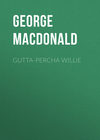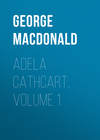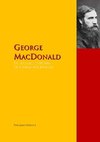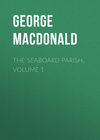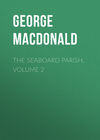Loe raamatut: «Alec Forbes of Howglen», lehekülg 21
"Just help me with my shawl," she said.
CHAPTER L
During all this time, Annie had seen scarcely anything of her aunt Margaret Anderson. Ever since Bruce had offended her, on the occasion of her first visit, she had taken her custom elsewhere, and had never even called to see her niece. Annie had met her several times in the street, and that was all. Hence, on one of the fine afternoons of that unusually fine summer, and partly, perhaps, from missing the kindness of Mrs Forbes, Annie took a longing to see her old aunt, and set out for Clippenstrae to visit her. It was a walk of two miles, chiefly along the high road, bordered in part by accessible plantation. Through this she loitered along, enjoying the few wild flowers and the many lights and shadows, so that it was almost evening before she reached her destination.
"Preserve 's a'! Annie Anderson, what brings ye here this time o' nicht?" exclaimed her aunt.
"It's a lang time sin I saw ye, auntie, and I wantit to see ye."
"Weel, come butt the hoose. Ye're growin' a great muckle quean," said her aunt, inclined to a favourable consideration of her by her growth.
Margaret "didna like bairns—menseless craturs—aye wantin' ither fowk to do for them!" But growth was a kind of regenerating process in her eyes, and when a girl began to look like a woman, she regarded it as an outward sign of conversion, or something equally valuable.—So she conducted her into the presence of her uncle, a little old man, worn and bent, with gray locks peeping out from under a Highland bonnet.
"This is my brither Jeames's bairn," she said.
The old man received her kindly, called her his dawtie, and made her sit down by him on a three-legged creepie, talking to her as if she had been quite a child, while she, capable of high converse as she was, replied in corresponding terms. Her great-aunt was confined to her bed with rheumatism. Supper was preparing, and Annie was not sorry to have a share, for indeed, during the summer, her meals were often scanty enough. While they ate, the old man kept helping her to the best, talking to her all the time.
"Will ye no come and bide wi' me, dawtie?" he said, meaning little by the question.
"Na, na," answered Margaret for her. "She's at the schule, ye ken, uncle, and we maunna interfere wi' her schoolin.'—Hoo does that leein' ted, Robert Bruce, carry himsel' to ye, bairn?"
"Ow! I jist never min' him," answered Annie.
"Weel, it's a' he deserves at your han'. But gin I war you, I wad let him ken that gin he saws your corn ye hae a richt to raither mair nor his gleanins."
"I dinna ken what ye mean," answered Annie.
"Ow! na; I daursay no. But ye may jist as weel ken noo, that that ted, Robert Bruce, has twa hunner poun' odd o' yer ain, lassie; and gin he doesna use ye weel, ye can jist tell him 'at I telt ye sae."
This piece of news had not the overpowering effect upon Annie which, perhaps, her aunt had expected. No doubt the money seemed in her eyes a limitless fortune; but then Bruce had it. She might as soon think of robbing a bear of her whelps as getting her own from Bruce. Besides, what could she do with it if she had it? And she had not yet acquired the faculty of loving money for its own sake. When she rose to take her leave, she felt little richer than when she entered, save for the kind words of John Peterson.
"It's ower late for ye to gang hame yer lane, dawtie," said the old man.
"I'm nae that fleyt," answered Annie.
"Weel, gin ye walk wi' Him, the mirk'll be licht aboot ye," said he, taking off his Highland bonnet, and looking up with a silent recognition of the care of Him. "Be a gude lass," he resumed, replacing his bonnet, "an' rin hame as fest's ye can. Gude nicht to ye, dawtie."
Rejoicing as if she had found her long-lost home, Annie went out into the deep gloamin feeling it impossible she should be frightened at anything. But when she came to the part of the road bordered with trees, she could not help fancying she saw a figure flitting along from tree to tree just within the deeper dusk of the wood, and as she hurried on, fancy grew to fear. Presently she heard awful sounds, like the subdued growling of wild beasts. She would have taken to her heels in terror, but she reflected that thereby she would only insure pursuit, whereas she might slip away unperceived. As she reached a stile leading into the wood, however, a dusky figure came bounding over it, and advanced towards her. To her relief it went on two legs; and when it came nearer she thought she recognized some traits of old acquaintance about it. When it was within a couple of yards of her, as she still pursued her way towards Glamerton, she stopped and cried out joyfully:
"Curly!"—for it was her old vice-champion.
"Annie!" was the equally joyful response.
"I thocht ye was a wild beast!" said Annie.
"I was only growlin' for fun to mysel'," answered Curly, who would have done it all the more if he had known there was any one on the road. "I didna ken 'at I was fleggin' onybody. An' hoo are ye, Annie? An' hoo's Blister Bruce?"
For Curly was dreadfully prolific in nicknames.
Annie had not seen him for six months. He had continued to show himself so full of mischief, though of a comparatively innocent sort, that his father thought it better at last to send him to a town at some distance to learn the trade of a saddler, for which he had shown a preference.
This was his first visit to his home. Hitherto his father had received no complaints of his behaviour, and had now begged a holiday.
"Ye're grown sair, Annie," he said.
"Sae are ye, Curly," answered Annie.
"An' hoo's Alec?"
"He's verra weel."
Whereupon much talk followed, which need not be recorded. At length
Curly said:
"And hoo's the rottans?"
"Ower weel and thrivin'."
"Jist pit yer han' i' my coat-pooch, and see what I hae broucht ye."
Knowing Curly's propensities, Annie refused.
"It's a wild beast," said Curly. "I'll lat it oot upo' ye. It was it 'at made a' that roarin' i' the plantin'."
So saying, he pulled out of his pocket the most delicate tortoiseshell kitten, not half the beauty of which could be perceived in the gloamin, which is all the northern summer night. He threw it at Annie, but she had seen enough not to be afraid to catch it in her hands.
"Did ye fess this a' the road frae Spinnie to me, Curly?"
"Ay did I, Annie. Ye see I dinna like rottans. But ye maun haud it oot o' their gait for a feow weeks, or they'll rive't a' to bits. It'll sune be a match for them though, I s' warran'. She comes o' a killin' breed."
Annie took the kitten home, and it shared her bed that night.
"What's that meowlin?" asked Bruce the next morning, the moment he rose from the genuflexion of morning prayers.
"It's my kittlin'," answered Annie. "I'll lat ye see't."
"We hae ower mony mou's i' the hoose already," said Bruce, as she returned with the little peering baby-animal in her arms. "We hae nae room for mair. Here, Rob, tak the cratur, an' pit a tow aboot its neck, an' a stane to the tow, an' fling't into the Glamour."
Annie, not waiting to parley, darted from the house with the kitten.
"Rin efter her, Rob," said Bruce, "an' tak' it frae her, and droon't.
We canna hae the hoose swarmin'."
Bob bolted after her, delighted with his commission. But instead of finding her at the door, as he had expected, he saw her already a long way up the street, flying like the wind. He started in keen pursuit. He was now a great lumbering boy, and although Annie's wind was not equal to his, she was more fleet. She took the direct road to Howglen, and Rob kept floundering after her. Before she reached the footbridge she was nearly breathless, and he was gaining fast upon her. Just as she turned the corner of the road, leading up on the other side of the water, she met Alec and Kate. Unable to speak, she passed without appeal. But there was no need to ask the cause of her pale agonized face, for there was young Bruce at her heels. Alec collared him instantly.
"What are you up to?" he asked.
"Naething," answered the panting pursuer.
"Gin ye be efter naething, ye'll fin' that nearer hame," retorted Alec, twisting him round in that direction, and giving him a kick to expedite his return. "Lat me hear o' you troublin' Annie Anderson, an' I'll gar ye loup oot o' yer skin the neist time I lay han's upo' ye. Gang hame."
Rob obeyed like a frightened dog, while Annie pursued her course to Howglen, as if her enemy had been still on her track. Rushing into the parlour, she fell on the floor before Mrs Forbes, unable to utter a word. The kitten sprung mewing out of her arms, and took refuge under the sofa.
"Mem, mem," she gasped at length, "tak' care o' my kittlin'. They want to droon't. It's my ain. Curly gied it to me."
Mrs Forbes comforted her, and readily undertook the tutelage. Annie was very late for school, for Mrs Forbes made her have another breakfast before she went. But Mr Malison was in a good humour that day, and said nothing. Rob Bruce looked devils at her. What he had told his father I do not know; but whatever it was, it was all written down in Bruce's mental books to the debit of Alexander Forbes of Howglen.
Mrs Forbes's heart smote her when she found to what persecution her little friend was exposed during those times when her favour was practically although not really withdrawn; but she did not see how she could well remedy it. She was herself in the power of Bruce, and expostulation from her would be worth little; while to have Annie to the house as before would involve consequences unpleasant to all concerned. She resolved to make up for it by being kinder to her than ever as soon as Alec should have followed Kate to the precincts of the university; while for the present she comforted both herself and Annie by telling her to be sure to come to her when she found herself in any trouble.
But Annie was not one to apply to her friends except she was in great need of their help. The present case had been one of life and death. She found no further occasion to visit Mrs Forbes before Kate and Alec were both gone.
CHAPTER LI
On a sleepy summer afternoon, just when the sunshine begins to turn yellow, Annie was sitting with Tibbie on the grass in front of her little cottage, whose door looked up the river. The cottage stood on a small rocky eminence at the foot of the bridge. Underneath the approach to it from the bridge, the dyer's mill-race ran by a passage cut in the rock, leading to the third arch of the bridge built over the Glamour. Towards the river, the rock went down steep to the little meadow. It was a triangular piece of smooth grass growing on the old bed of the river, which for many years had been leaving this side, and wearing away the opposite bank. It lay between the river, the dyer's race, and the bridge, one of the stone piers of which rose from it. The grass which grew upon it was short, thick, and delicate. On the opposite side of the river lay a field for bleaching the linen, which was the chief manufacture of that country. Hence it enjoyed the privilege of immunity from the ploughshare. None of its daisies ever met the fate of Burn's
"Wee, modest, crimson-tippit flower."
But indeed so constantly was the grass mown to keep it short, that there was scarcely a daisy to be seen in it, the long broad lines of white linen usurping their place, and in their stead keeping up the contrast of white and green. Around Tibbie and Annie however the daisies were shining back to the sun, confidently, with their hearts of gold and their rays of silver. And the butter-cups were all of gold; and the queen-of-the-meadow, which grew tall at the water-side, perfumed the whole region with her crown of silvery blossom. Tibbie's blind face was turned towards the sun; and her hands were busy as ants with her knitting needles, for she was making a pair of worsted stockings for Annie against the winter. No one could fit stockings so well as Tibbie.
"Wha's that comin', lassie?" she asked.
Annie, who had heard no one, glanced round, and, rising, said,
"It's Thomas Crann."
"That's no Thomas Crann," rejoined Tibbie. "I dinna hear the host (cough) o' 'im."
Thomas came up, pale and limping a little.
"That's no Thomas Crann?" repeated Tibbie, before he had time to address her.
"What for no, Tibbie?" returned Thomas.
"'Cause I canna hear yer breath, Thamas."
"That's a sign that I hae the mair o' 't, Tibbie. I'm sae muckle better o' that ashma, that I think whiles the Lord maun hae blawn into my nostrils anither breath o' that life that he breathed first into Edam an' Eve."
"I'm richt glaid to hear't, Thamas. Breath maun come frae him ae gait or ither."
"Nae doobt, Tibbie."
"Will ye sit doon asides's, Thamas? It's lang sin' I hae seen ye."
Tibbie always spoke of seeing people.
"Ay will I, Tibbie. I haena muckle upo' my han's jist the day. Ye see I haena won richt into my wark again yet."
"Annie an' me 's jist been haeing a crack thegither aboot this thing an' that thing, Thamas," said Tibbie, dropping her knitting on her knees, and folding her palms together. "Maybe ye could tell me whether there be ony likeness atween the licht that I canna see and that soun' o' the water rinnin', aye rinnin', that I like sae weel to hear."
For it did not need the gentle warm wind, floating rather than blowing down the river that afternoon, to bring to their ears the sound of the entick, or dam built across the river, to send the water to the dyer's wheel; for that sound was in Tibbie's cottage day and night, mingled with the nearer, gentler, and stronger gurgling of the swift, deep, deedie water in the race, that hurried, aware of its work, with small noise and much soft-sliding force towards the wheel.
"Weel, ye see, Tibbie," answered Thomas, "it's nearhan' as ill for the like o' us to unnerstan' your blin'ness as it may be for you to unnerstan' oor sicht."
"Deed maybe neyther o' 's kens muckle aboot oor ain gift either o' sicht or blin'ness.—Say onything ye like, gin ye dinna tell me, as the bairn here ance did, that I cudna ken what the licht was. I kenna what yer sicht may be, and I'm thinkin' I care as little. But weel ken I what the licht is."
"Tibbie, dinna be ill-nater'd, like me. Ye hae no call to that same. I'm tryin' to answer your queston. And gin ye interrup' me again, I'll rise an' gang hame."
"Say awa', Thamas. Never heed me. I'm some cankert whiles. I ken that weel eneuch."
"Ye hae nae business to be cankert, Tibbie?"
"Nae mair nor ither fowk."
"Less, Tibbie; less, woman."
"Hoo mak' ye that oot?" asked Tibbie, defensively.
"Ye dinna see the things to anger ye that ither fowk sees.—As I cam' doon the street this minute, I cam' upo' twa laddies—ye ken them—they're twins—ane o' them cripple—"
"Ay, that was Murdoch Malison's wark!" interposed Tibbie, with indignant reminiscence.
"The man's been sorry for't this mony a day," said Thomas; "sae we maunna come ower't again, Tibbie."
"Verra weel, Thamas; I s' haud my tongue. What about the laddies?"
"They war fechtin' i' the verra street; ruggin' ane anither's heids, an' peggin' at ane anither's noses, an' doin' their verra endeevour to destroy the image o' the Almichty—it wasna muckle o' 't that was left to blaud. I teuk and throosh them baith."
"An' what cam' o' the image o' the Almichty?" asked Tibbie, with a grotesque contortion of her mouth, and a roll of her veiled eyeballs. "I doobt, Thamas," she continued, "ye angert yersel' mair nor ye quaietit them wi' the thrashin'. The wrath o' man, ye ken, Thamas, worketh not the richtyisness o' God."
There was not a person in Glamerton who would have dared to speak thus to Thomas Crann but Tibbie Dyster, perhaps because there was not one who had such a respect for him. Possibly the darkness about her made her bolder; but I think it was her truth, which is another word for love, however unlike love the outcome may look, that made her able to speak in this fashion.
Thomas was silent for a long minute. Then he said:
"Maybe ye're i' the richt, Tibbie. Ye aye anger me; but I wad raither hae a body anger me wi' tellin' me the trowth, nor I wad hae a' the fair words i' the dictionar'. It's a strange thing, wumman, but aye whan a body's tryin' maist to gang upricht he's sure to catch a dreidfu' fa'. There I hae been warstlin' wi' my ill-temper mair nor ever I did i' my life afore; and I never i' my days lickit twa laddies for lickin' ane anither till jist this verra day. And I prayed against mysel' afore I cam' oot. I canna win at the boddom o' 't."
"There's waur things nor an ill temper, Thamas. No that it's bonnie ava'. And it's nane like Him 'at was meek and lowly o' hert. But, as I say, there's waur fauts nor an ill temper. It wad be no gain to you, Thamas, and no glory to Him whase will's your sanctification, gin ye war to owercome yer temper, and syne think a heap o' yersel' that ye had done't. Maybe that's what for yer no allooed to be victorious in yer endeevours."
"'Deed, maybe, Tibbie," said Thomas solemnly. "And I'm some doobtfu' forbye, whether I mayna be tryin' to ripe oot the stockin' frae the wrang en' o' 't. I doobt the fau't's nae sae muckle i' my temper as i' my hert. It's mair love that I want, Tibbie. Gin I lo'ed my neebor as mysel', I cudna be sae ill-natert till him; though 'deed, whiles, I'm angry eneuch at mysel'—a hantle waur nor at him."
"Verra true, Thamas," answered Tibbie. "Perfect love casteth oot fear, 'cause there's nae room for the twa o' them; and I daursay it wad be the same wi' the temper."
"But I'm no gaein' to gie in to bein' ill-natert for a' that," said
Thomas, as if alarmed at the possible consequences of the conclusion.
"Na na. Resist ye the deevil, Thamas. Haud at him, man. He's sure to rin at the lang last. But I'm feared ye'll gang awa' ohn tellt me aboot the licht and the water. Whan I'm sittin' here o' the girse, hearkenin' to the water, as it comes murrin', and soufflin', and gurglin', on to me, and syne by me and awa', as gin it war spinnin' and twistin' a lot o' bonnie wee sounies a' intil ae muckle gran' soun', it pits me i' min' o' the text that says, 'His voice was as the sound o' mony waters.' Noo his face is licht—ye ken that, divna ye?—and gin his voice be like the water, there maun be something like atween the licht and the water, ye ken. That's what garred me spier at ye, Thamas."
"Weel, I dinna ken richtly hoo to answer ye, Tibbie; but at this moment the licht's playin' bonnie upo' the entick—shimmerin' and brakin' upo' the water, as hit bracks upo' the stanes afore it fa's. An' what fa's, it luiks as gin it took the licht wi' 't i' the wame o' 't like. Eh! it's bonnie, woman; and I wiss ye had the sicht o' yer een to see't wi'; though ye do preten' to think little o' 't."
"Weel, weel! my time's comin', Thamas; and I maun jist bide till it comes. Ye canna help me, I see that. Gin I could only open my een for ae minute, I wad ken a' aboot it, and be able to answer mysel'.—I think we 'll gang into the hoose, for I canna bide it langer."
All the time they were talking Annie was watching Alec's boat, which had dropped down the river, and was floating in the sunshine above the dam. Thomas must have seen it too, for it was in the very heart of the radiance reflected to them from the watery mirror. But Alec was a painful subject with Thomas, for when they chanced to meet now, nothing more than the passing salute of ordinary acquaintance was exchanged. And Thomas was not able to be indulgent to young people. Certain facts in his nature, as well as certain articles in his creed, rendered him unable. So, being one of those who never speak of what is painful to them if they can avoid it—thinking all the more, he talked about the light, and said nothing about the boat that was in the middle of it. Had Alec been rowing, Tibbie would have heard the oars; but he only paddled enough to keep the boat from drifting on to the dam. Kate sat in the stern looking at the water with half-closed eyes, and Alec sat looking at Kate, as if his eyes were made only for her. And Annie sat in the meadow, and she too looked at Kate; and she thought how pretty she was, and how she must like being rowed about in the old boat. It seemed quite an old boat now. An age had passed since her name was painted on it. She wondered if The Bonnie Annie was worn off the stern yet; or if Alec had painted it out, and put the name of the pretty lady instead. When Tibbie and Thomas walked away into the house, Annie lingered behind on the grass.
The sun sank slanting and slow, yet he did sink, lower and lower; till at length Alec leaned back with a stronger pull on the oars, and the boat crept away up the stream, lessening as it crept, and, turning a curve in the river, was lost. Still she sat on, with one hand lying listlessly in her lap, and the other plucking blades of grass and making a little heap of them beside her, till she had pulled a spot quite bare, and the brown earth peeped through between the roots. Then she rose, went up to the door of the cottage, called a good night to Tibbie, and took her way home.











